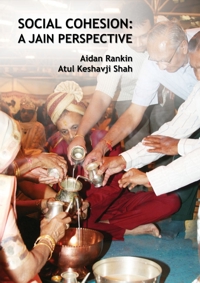We have seen that the twin ideas of interconnectedness and interdependence lie at the heart of Jain philosophy, and inform every aspect of the Jain way of life. Even the principle of Ahimsa (non-violence, non-injury) arises from these two concepts. If we are connected to each other, directly or indirectly, if we depend on the ability to co-operate with each other for our physical and spiritual well-being, then it follows that we must minimise harmful activities and maximise creative, positive and compassionate acts. Therefore, we must act carefully at all times, aware of the impact of each of our actions (including thoughts), whether short-term and long-term, obvious or subtle.
The injunction to act carefully applies equally to the individual and the human community of whatever size - family, locality, nation or international networks such as the United Nations, European Union or Commonwealth. It applies equally to the private and public spheres, the world of work and the voluntary activities we choose to pursue.
Interconnectedness takes us beyond the idea of a purely human community towards a ‘community of beings’ of which humans are an integral part. Interdependence means a shift of emphasis away from competition with and control over fellow humans towards co-operation and finding common ground. At the same time, it requires us to work with ‘the rest’ of nature, rather than regarding it as something other than ourselves, a hostile force to be ‘conquered’ or a mere collection of resources to be exploited.
In other words, there is a connection between aggressive policies towards other countries or peoples and the invasions of other species’ habitats in the name of human expansionism. There is a connection between the torture of animals in laboratories and ill-treatment of the disabled, the mentally ill or the vulnerable old and young. A society that tolerates factory farming also accepts dehumanising social conditions, production-line education and gross disparities of income and life chances. Callous indifference to the natural world is linked intimately to callous indifference towards fellow-humans, which leads to family and community breakdown. Restoring social cohesion means breaking a series of negative patterns arising from an artificial sense of separation - of humanity from the rest nature and of human beings from each other.
This approach rejects any distinction between our social and ecological activities. Or, to put it more positively, it reintegrates social and environmental concerns. Social cohesion and ecological balance are intimately linked, rather than separate, compartmentalised ‘issues’. The social-ecological continuum recognised by Jains makes their thinking especially relevant to a society trying to rethink its attitude to the environment and aware that materialism does not satisfy us ultimately, but does social and psychic harm.
More than that, Jain values provide a useful template for living in a pluralist society, and in a ‘borderless’ world where economic, political and cultural boundaries are blurring increasingly. The experience of Jains as a perpetual minority has enabled them to integrate and participate fully while simultaneously maintaining and developing a distinctive cultural identity. Jains have been able to combine adaptability with the retention of first principles. The philosophy of non-violence, intellectual as much as physical, allows for tolerance and accommodation without the need for compromise. Globalisation, and the fact of a culturally diverse society, means that we can no longer assume the superiority of ‘our’ values, or their inevitable ‘triumph’ over others, and so from the ancient and peaceful wisdom of Jain dharma we can take the gift of humility. That principle reinforces (rather than opposing or challenging) the majority Judaeo-Christian and humanist traditions of British society. It creates an ethical framework of respect and inclusion in place of division and difference.
Jainism’s contribution to social cohesion is to offer an alternative new way of thinking based on interconnectedness and interdependence. It is a holistic approach that aims to reach beyond boundaries and make common cause, rather than focus on division and difference. It is a philosophy of both/and rather than either/or.
Individual and social interests are identical, because each of us is a social being and society is the sum total of its individual parts. From this it follows that each human life, each individual contribution, matters equally. Each individual success is a social success and each failure to achieve full potential is a failure for society as a whole. Likewise, human welfare and the welfare of the planet wholly coincide. Environmental problems are social problems and social cohesion is an ecological issue as much as it is specifically human. Jainism is an ancient faith that values accumulated wisdom, tradition and continuity, and is based on the unalterable law of non-violence. At the same time, it is a highly ‘modern’ philosophy that values reason, welcomes change and actively promotes gender and racial equality. Social cohesion involves recognising the continuous, creative tension between continuity and change, accepting that social evolution can only take place successfully when it is built on enduring ethical foundations.
As a society, we failed to recognise this when, in the name of modernity, we destroyed thriving urban communities and replaced them with soulless housing estates. We made the same mistake when, in the name of greater freedom and choice, we eroded the familial and communal ties that gave stability and purpose to our lives. Today, we are reaping the consequences of this one-sided view of progress. It has made us in many ways less free, less safe and less fulfilled, despite apparent prosperity and the blandishments of consumerism. Addiction and compulsive behaviour, gang culture and the retreat into fundamentalism as a quest for certainty are all symptoms of a malaise created by one-sided thinking.
Yet there is a rising awareness of the need to reconnect, with ourselves and with the planet. There is a sense that economic growth does not necessarily correspond with quality of life, that ‘freedom’ and ‘choice’ mean little without security and mutual trust. In this change of consciousness, political and - in the broadest sense - spiritual concerns come together. This is where Jainism, based on reconciliation and the healing of wounds, can play a positive role where twentieth century political ideologies have retreated. And unlike those ideologies, it will not seek to impose itself as a universal truth, for social cohesion is about unity-in-diversity, rather than the creation of a monoculture. Jains themselves can play a role, as educators, peacemakers and community organisers, for there is no distinction in Jainism between actions and ideas, philosophy and lived experience.
Two and a half millennia ago, Mahavira recognised that ‘non-violence and kindness to living beings is kindness to oneself’. This ancient insight is a message for our time.
 Aidan Rankin
Aidan Rankin
 Dr. Atul Keshavji Shah
Dr. Atul Keshavji Shah
